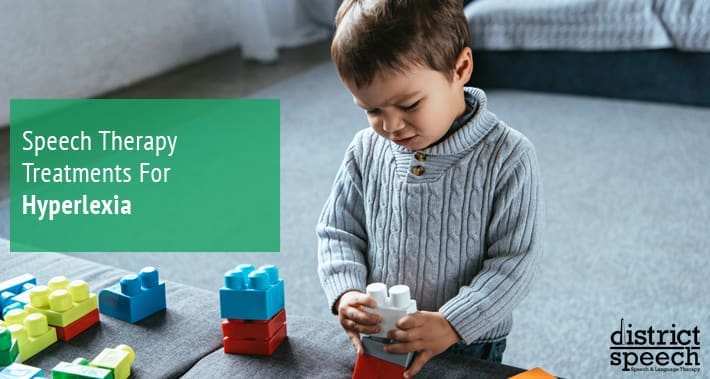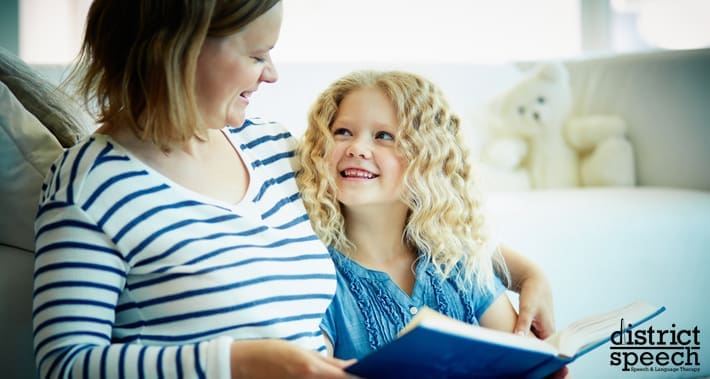
Hyperlexia is a learning disability and condition characterized by early reading and reading beyond what’s common for the child’s age group.
This typically occurs in preschool aged kids, and usually starts before the age of 5.
The name hyperlexia can be broken down into parts.
“Hyper” means above average, while “lexia” is related to reading or language.
If your child has hyperlexia, they tend to develop their reading skills early, without training.
While you might think this is a good thing, children with hyperlexia typically have below average reading comprehension and communication skills.
However, there is hope.
Our pediatric speech therapists in DC can help strengthen your child’s speaking and comprehension abilities.
Now, let’s find out more.
What Is Hyperlexia?
Hyperlexia is a learning disability where your child can read at much higher grade level than expected for their current age.
RELATED: Learning Disabilities Speech Therapy
Hyperlexia will typically manifest between the ages of two and four.
It’s also possible that children with this condition can start reading as young as 18 months.
This condition typically also involves an obsession with letters and numbers, and a large vocabulary.
Children with hyperlexia tend to learn to decode and sound out words very quickly.
However, they’re less likely to understand what they’re reading.
It’s also common for kids with hyperlexia to have lower than average spoken communication skills for their age.
There are three different types of hyperlexia: hyperlexia I, hyperlexia II, and hyperlexia III.
Let’s take a look.
Hyperlexia I
Hyperlexia I is when your child starts reading beyond their grade level, but doesn’t have any other signs of a disability or disorder.
Due to this, hyperlexia type I is not a disorder, and is temporary in nature.
They may have a head start, but their peers will generally catch up with them.
Hyperlexia II
Hyperlexia II occurs when those with autism spectrum disorder read beyond their grade level.
The main signs of this type of hyperlexia are:
- Ability to read beyond what is expected
- Obsession with numbers or letters
- Learning in a rote way or in chunks of information
- Preference for books over other toys
- Remembering license plates and other number sequences well
Children with hyperlexia II usually show signs of autism.
RELATED: Autism FAQ
These may include:
- Sensitivity to sensory stimuli
- Avoiding eye contact
- Resistance to change
- Stimming or repetitive physical behaviors
- Playing with toys in an unusual way
Hyperlexia III
Hyperlexia III is similar to hyperlexia II.
The main difference is that the autistic like behavioral signs usually decrease over time, and eventually disappear eventually.
Children with hyperlexia III also tend to give eye contact and display affection with their immediate family members.
The characteristics of hyperlexia III in children include:
- Below average speaking skills
- Great memory
- Below average communication skills
- Usually speak by rote and heavy repetition
- Difficulty learning to use toys or puzzles
- Difficulty learning the rules of games
- A love of books
- Learning to read quickly
Who’s Most Likely To Have Hyperlexia?
Gender statistics on hyperlexia show that boys are more likely to be diagnosed with hyperlexia than girls.
As mentioned above, hyperlexia is closely associated with autism – more on that in a moment.
However, hyperlexia may also frequently occur with other developmental disorders, including:
- Attention deficit hyperactivity disorder (ADHD)
- Turner syndrome
- Tourette’s syndrome
The Relationship Between Hyperlexia And Autism
There is a very strong relationship between hyperlexia and autism.
Autistic children and kids with hyperlexia both struggle with reading comprehension.
A 2017 review by Ostrolenk Et Al found that 84% of children with hyperlexia are also autistic.
But while most kids with hyperlexia are autistic, the reverse is not true.
In fact, only around one in ten autistic children have hyperlexia.
RELATED: Autism Screening For Children
The Relationship Between Hyperlexia And Dyslexia
Both hyperlexia and dyslexia are learning disabilities.
Like hyperlexia, kids with dyslexia may benefit from speech therapy.
Other than this similarity, the relationship between hyperlexia and dyslexia is one of opposites.
Where hyperlexia is characterized by extraordinary reading skills, the characteristics of dyslexia usually involve difficulty learning to read and spell.
However, dyslexic children are more likely to understand what they’re reading and typically have strong communication and comprehension skills.
They are also fast and creative thinkers.
On the other hand, those with hyperlexia, tend to have lower than average reading comprehension and communication skills.
Dyslexia is generally much more common than hyperlexia.
Unlike what the myths on dyslexia may have you believe, your child will typically not just “grow out of” dyslexia.
With both conditions, early intervention can help with the issues that arise.

How Can A Speech Therapist Help With Hyperlexia?
You may be wondering what age your child should see a speech therapist.
If your child shows signs of hyperlexia and isn’t meeting their milestones, speech therapy can greatly help to improve their language and social skills.
A good speech pathologist will use your child’s advanced reading abilities to help develop and improve on their weaknesses.
They will typically focus on their social skills and understanding, because this is usually what is weakest in children with hyperlexia.
Some children with hyperlexia may also be diagnosed with social communication disorder and benefit from speech therapy for social communication issues.
Your speech therapist will first evaluate your child and determine what their particular strengths and weaknesses are.
Then, they will create a treatment plan that will be tailored to their needs.
Typically, this plan will include:
- Social skills
- Higher level language skills
- Writing skills
- Help with speaking
- Reading comprehension
The amount of time your speech therapist focuses on each area will be unique to your child.
Your speech therapist will also take into account that there is a high chance your child is autistic.
As a result, they’ll incorporate goals for both autism and hyperlexia into your child’s tailored treatment plan.
Then, once a sound plan is established, there are a number of strategies they could use to work on these areas.
Some speech therapy strategies for hyperlexia include:
- Visual schedules and timelines
- Association games teaching work relations
- Games that help with social skills
- Visual methods for understanding
- Cause and effect predictions
- Augmentive and alternative communication where required
They’ll provide take home strategies for parents and teachers to continue the learning for your child outside of particular appointments.
RELATED: Kids Speech Therapy Exercises You Can Do With Sidewalk Chalk
Full integration of their speech and language treatment program across a number of environments greatly raises the effectiveness of the program.
As with most speech and language disorders, early intervention with speech therapy is significantly more effective than later treatment.
As a result, it’s a good idea to seek speech therapy as soon as you begin to see the signs of hyperlexia.
Book Your Appointment With District Speech Today
Speech therapy is a great resource to use if your child has hyperlexia.
Plus, since there is a good chance that your child may also be autistic, your speech therapist can consider both and incorporate it into their treatment plan.
Hyperlexia affects comprehensions, and so it’s very important to start treatment early.
This is to help your child catch up to their grade level quickly.
The more time they spend struggling, the further they can fall behind.
District Speech has a team of highly specialized pediatric therapists ready to help.
Book your appointment with District Speech today.
1300 I St NW, Suite 400 E,
Washington, DC 20005
- https://g.page/districtspeech
District Speech and Language Therapy specializes in speech therapy, physical therapy, and occupational therapy solutions, for both children and adults, in the Washington D.C and the Arlington Virginia areas.